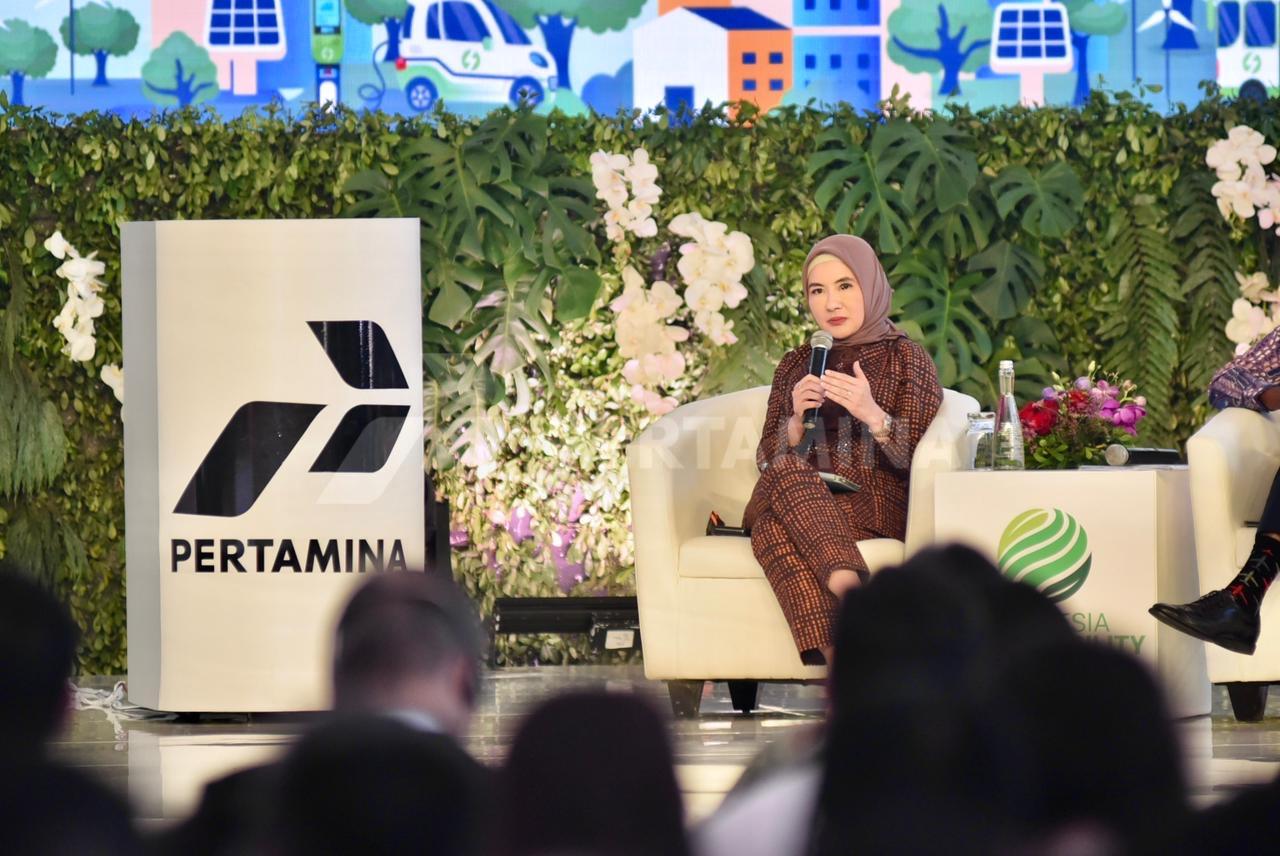 The President Director of Pertamina, Nicke Widyawati, delivers a presentation as a speaker during a panel discussion session at the Indonesia Sustainability Forum at Hotel Park Hyatt, Jakarta, on Thursday (7/9/2023).
The President Director of Pertamina, Nicke Widyawati, delivers a presentation as a speaker during a panel discussion session at the Indonesia Sustainability Forum at Hotel Park Hyatt, Jakarta, on Thursday (7/9/2023).
Pertamina's Priority Steps in Low Carbon Fuel Development
Jakarta, September 8, 2023 – In facing the energy trilemma, Pertamina is taking priority steps in low carbon fuels and new renewable energy sources development following the challenges faced by Indonesia as a developing country.
During the Indonesia Sustainability Forum (ISF) 2023 Plenary Session in Jakarta on Thursday, September 7, 2023, the President Director of PT Pertamina (Persero), Nicke Widyawati, emphasized that the main factors in the low carbon fuels and new renewable energy development are technology, economics, and regulations.
According to Nicke, several factors contribute to low carbon fuel's high prices. The first is technology, where technological advancements can reduce capital expenditure (CAPEX) and operational expenditure (OPEX).
"Technology will be more efficient in water, energy, and raw materials consumption utilization, which is crucial. Additionally, technology that can process raw materials into second-generation resources, addressing waste from raw materials, is also important," said Nicke.
The second factor is ecosystem development. Nicke mentioned that new product development requires a holistic approach, starting from longer supply chains to the overall ecosystem.
The third factor is economic capability. Pertamina needs the economic capacity to initiate product development. Hence, regulations are necessary to create demand.
"As an example in Indonesia, the B35 or biodiesel utilization is mandatory according to regulations, which leads to a gradual increase in demand. When there is demand, investments will flow. This is crucial for biofuel, SAF (Sustainable Aviation Fuel), hydrogen, ammonia, and other energy sources," added Nicke.
The fourth factor is the community’s readiness, both as producers and consumers, achieved through raising awareness and education. These four factors need to be elevated together.
"I believe that the transition to low carbon fuels requires a holistic approach involving the government, private sector, the public, investors, and funders," Nicke emphasized.
In the same session, the Secretary of the Ministry of State-Owned Enterprises (SOE), Rabin Indrajad Hattari, explained that future fuel development must consider energy independence. Some potential options under consideration include geothermal, hydro, solar, biodiesel, bioethanol, and LNG, the latter of which is currently being developed by Pertamina.
"Indonesia is a country that is rich in natural resources. Biofuels and energy from waste are some of the areas we are working on in collaboration with several relevant ministries, especially the Ministry of Energy, to strengthen not only our state-owned enterprises (SOE) but also the private sector," stated Rabin.
Anand Stanley, President of Airbus Asia-Pacific, emphasized that the first step in aviation decarbonization is reducing fuel consumption. Over the last 50 years, fuel consumption per seat of travel on Airbus aircraft has reduced by 80 percent. According to him, the most promising sustainable aviation fuel is SAF.
"Airbus has committed to having aircraft using hydrogen by 2035. What is intriguing about hydrogen is its minimal carbon footprint, starting from raw materials to delivery," said Anand.
Franky Widjaja, Chairman of SMART (PT Sinar Mas Agro Resources & Technology), mentioned that over the past ten to fifteen years, Sinar Mas has focused on sustainable agriculture and sustainable growth, including collaborating with the government on the Biodiesel Plus 35 percent (B35) policy.
"Ensuring sustainability, providing financing, and addressing price differences or any factors enabling consistent supply to the industry are our key concerns," Franky stated.
Nicke added that Pertamina fully supports the government's target of achieving net-zero emissions by 2060. However, it is fully recognized that their primary mandate is to ensure energy security.
"Therefore, we are committed to continually providing all the fuel needs necessary as a catalyst for economic growth. We are determined to ensure economic growth continues throughout the journey toward net-zero emissions," Nicke concluded.
Pertamina, as a leading company in the energy transition, is committed to supporting the Net Zero Emission 2060 target by continuously promoting programs that directly impact the Sustainable Development Goals (SDGs) achievement. All these efforts align with Environmental, Social & Governance (ESG) implementation across all Pertamina's business lines and operations.**